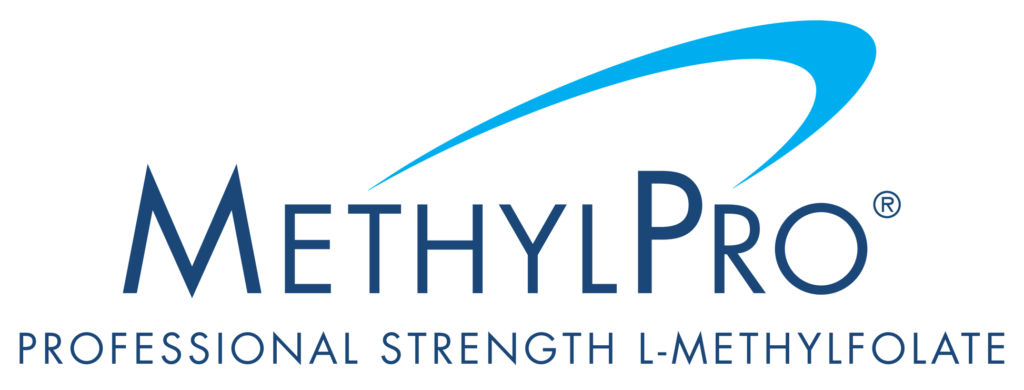Our MethylPro line of products includes the option to take your daily l-methylfolate encapsulated with its “cofactors”. Read on to learn more about cofactors and why they might be an important addition to maximize the benefits of your MethylPro methylfolate.
Cofactors are essentially helper molecules that allow biochemical reactions to occur. Some cofactors are inorganic metal ions such as iron and magnesium. Organic (carbon-containing) cofactors are sometimes classified more specifically as “coenzymes”. Coenzymes primarily assist the action of enzymes, but these words are generally interchangeable. All of the water-soluble vitamins (Bs and C), and two fat-soluble vitamins (A and K) fall into this category of coenzymes/cofactors [1].
What do cofactors do?
Vitamin cofactors play a role in a multitude of biochemical reactions involving energy metabolism. They are also necessary for processes necessary for proper vision, blood coagulation, hormone production, and the integrity of collagen [1]. Collagen is a protein found in bones, skin, cartilage, and other structural tissues [1].
Some cofactors function by ferrying electrons or negative charges to enhance a reaction. Vitamins B-2, B-3, and C are all precursors of electron-carrying coenzymes. Vitamin C (ascorbic acid) is a cofactor for the hydroxylase enzymes. These are the enzymes that support the structural integrity of collagen, the hydroxylation of cholesterol to form bile acids, and the synthesis of norepinephrine (noradrenaline) from the amino acid tyrosine [1].
Three activated forms of riboflavin (vitamin B-2) serve as hydrogen carriers to assist in the Kreb’s/citric acid cycle. This biological process produces cellular energy. The vitamin cofactor forms of niacin (B-3) play a role in the catabolism of fat, carbohydrates, and amino acids, and in the enzymes involved in the synthesis of fats, steroids, and other vital metabolites.
B-5 (Pantothenic acid) is a component of coenzyme A. Coenzyme A is necessary for the metabolism of carbohydrates, amino acids, fatty acids, and other biomolecules as well as the synthesis of fatty acids.
Vitamin B-6 has two coenzyme forms that serve as cofactors in over 120 enzyme reactions (too many to list here). Vitamin B-12 serves as an important cofactor in methylation: converting homocysteine to methionine and recycling the methyl group from methylfolate. Folate then can be converted into its coenzyme form, allowing for amino acid conversion reactions and the synthesis of nucleic acids, RNA and DNA [1].
Why would I want cofactors in my supplement?
No single nutrient is going to make us healthy. We need many nutrients to work together, synergistically, to keep our complex and powerful biological systems functioning.
For example, we can all agree oranges are a healthy food. They are full of vitamin C, which is essential, and sugars that provide a substrate for cellular energy. But you can’t thrive on oranges alone; even if you ate a truckload every day. Your body needs balance.
When a supplement includes cofactors, it is like making sure you get some lean protein and healthy fat onto the plate with your oranges. Cofactors balance a beneficial nutrient with other different, but complementary, nutrients to make sure whatever body system you are aiming to support also has the other elements it needs for those important biochemical reactions to work efficiently.
Do some supplements include cofactors?
Yes! The more researchers learn about the cofactors needed to support the function of supplemental nutrients, the more nutritional health companies are able to supply products that contain everything you need for the maximum nutritional benefit from your supplement.
You can purchase MethylPro L-methylfolate with cofactors included.
What do the Cofactors in MethylPro do?
L-methylfolate does not work alone in your cells. It needs a number of cofactors present at adequate levels to do its job. The most important cofactors for folate (provided by the L-methylfolate Plus Cofactors formula by MethylPro) are B-6 and B-12.
Homocysteine levels can build up in the blood without vitamin B-6, as B-6 aids in glutathione synthesis using homocysteine [2]. Healthy homocysteine levels are associated with a healthy cardiovascular system, among other health benefits.
B-12 deficiency can also halt the same cycle, but by preventing homocysteine’s transformation to methionine. L-methylfolate and B-12 are essentially coenzymes in the folate methylation process. More specifically, methionine synthase catalyzes the primary remethylation pathway with the help of vitamin B-12 and activated folic acid (L-methylfolate) [2].
Magnesium has also been added to this formula as it is a cofactor in more than 325 enzymatic reactions and about two-thirds of the American population are estimated to be magnesium deficient [3]. Magnesium is a cofactor for the COMT enzyme, which transfers a methyl group from SAMe to metabolize dopamine, norepinephrine, and epinephrine [3].
Many people who have experienced folate insufficiency due to genetic mutations have also experienced the downstream effects of mood imbalance from insufficient or dysregulated neurotransmitter synthesis. Once the methylation cycle is stabilized with supplementation, adequate magnesium levels become more important as the body and brain need to process the upregulation of neurotransmitters being created [3].
Cofactors and Mood Support
Unfortunately there is a vicious cycle when it comes to stress and nutrition. Vitamins and minerals, including magnesium, are used more quickly in the body in states of physical and mental stress [3]. When you need the benefits of nutrition the most, nutrients are typically less available.
Knowing this, when you are under stress, you may want to boost your nutrient intake. This may be especially important for the cofactors necessary to assist in the process of methylation. Your mood may also be uniquely difficult to keep balanced under stress, in part due to the availability of nutrition.
Specifically, magnesium is a great stress and mood support mineral. Not only is it necessary for methylation and downstream processes, it also plays a role in the relaxation of muscles and physical calming of the body [4]. On top of these, magnesium offers benefits to bones, energy, the cardiovascular system, muscular system, dental health, insulin signaling, and general emotions [4]. Try MethylPro with Cofactors to tap into these health benefits.

